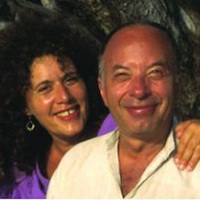There is no true religion or spirituality without kindness and love. ~ Swami Brahmananda
Ed was raised in the Jewish faith (as he says, Jewish on his parents side!), Deb was raised a Quaker.
We both began spiritually seeking at the same time in the late 1960’s. Ed was in his twenties living in New York City, hanging out at Studio 54 and other discos; meanwhile Deb was an art student living in London. And when Ed was in India being ordained as a Swami — a monk in the Yoga tradition — Deb was being ordained as a Buddhist. We both became teachers in our respective traditions, but by the time we met in the 1980s we had each left being part of a traditional order and were on our own, having decided to explore what it is to live a spiritual life in the midst of a materialistic world. We were like foreigners, finding our way in a world that was not so inclined or sympathetic towards spiritual life.
Essentially, religion is designed to be our spiritual source of comfort and advice, a structure to provide moral guidelines, a caring community, and help for those in need. And in many ways it is. But religion is also the cause of violence, wars, discrimination, bigotry, pain and suffering, all of which are a long way from kindness, compassion, comfort and spiritual reassurance.
Religious morality is also used to justify political reasoning and supremacy. In the U.S., the 1st amendment draws a clear separation between church and state, between religion and politics. Yet every presidential candidate is judged by his or her religious beliefs, as seen in the attempt to prove that President Obama is a Muslim, more so because his name is Barack Hussein Obama, which generates fear and hate.
Prospective Republican candidates use their Christian beliefs as a form of qualification and go to great lengths to show that a good Christian is a Republican, thereby implying that Democrats are not. We remember watching Bill Moyer (during George W. Bush’s era) interviewing a Kansas couple being evicted from their home due to spiraling mortgage costs. As the movers were carrying out their furniture around them, Moyer looked puzzled and asked why they had voted Republican. They replied: “Because we are Christians!”
We often hear somewhat extreme candidates constantly pushing their religious beliefs into the political arena with outrageous statements like: The hurricane and earthquake happened as God is punishing us, whether it’s because of gay marriage, abortion, or any number of reasons that support their ideology.
This is taking religion into realms that are not religious. When religion is used to validate killing because there is a difference of opinion, then it has gone beyond having a moral compass to imposing belief and power over another. We see this with the killing of abortion clinic staff, all in the name of saving a fetus, despite the pregnancy being caused by rape or incest, or threatening the mother’s life. Yet how many who are trying to stop abortion are also willing to adopt an unwanted baby?
At the same time, spirituality is a loaded word, often misunderstood, as its practices include meditation, contemplation, and direct communication with universal consciousness. Pope John Paul condemned meditation and yoga as immoral, deluding, and even sinful. Yet spirituality is simply the discovery of our authentic self without any trimmings or labels, which gives us a rich source of values and a deeper meaning to life, whatever our religion.
In the seeking of such meaning, religion and spirituality come together. Spirituality highlights qualities such as caring, kindness, compassion, tolerance, service, and community, and, in its truest sense, so does religion. But where religion is defined by its tradition and teachings, spirituality is defined by what is real in our own experience, arising from an inner search within ourselves, the finding of our own truth.
Where religion tends to breed separation — my religion vs. your religion; my god is the only real god; my ethics are better than yours, etc. — spirituality sees all people as equal: we are not an “ism” or a label, we are spiritual beings whose purpose is to awaken to our true nature.
Buddha wasn’t a Buddhist, Jesus wasn’t a Christian; the great ones did not create a religion, they just said to look within. They realized the truth that is always here, always present, but so easily forgotten. We are not able to see because of a mind that is veiled by ignorance, hate and greed: the ‘me-centeredness’ that rules and deludes.
When we were with the Dalai Lama at his residence in India we asked him what we could do to help humankind to awaken to caring and kindness. He said how people of different religions should come together in peace and respect and talk openly, honoring each others’ differences and similarities. This is a great example of religion and spirituality coming together.
Top photo by Hannah Sheffield at flickr.com











Read 10 comments and reply